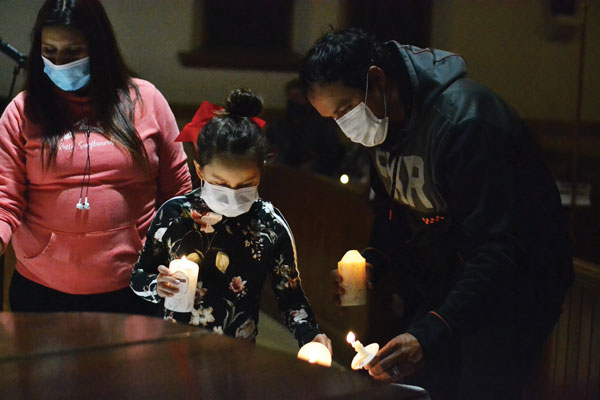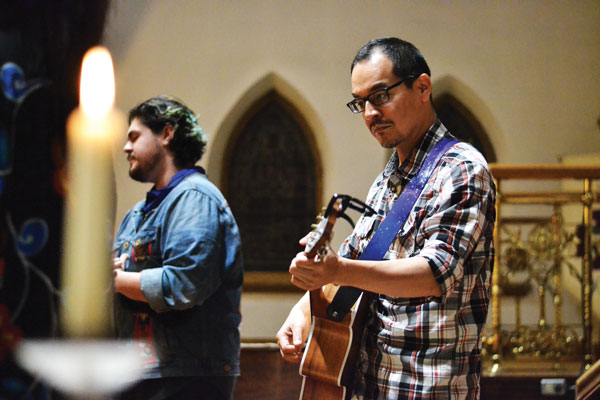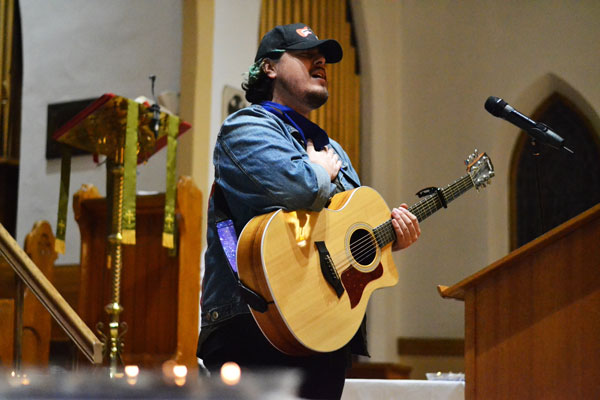
Warning: This story contains discussions of suicide.
How are you?
That’s a question Kevin Joseph wants people to start taking seriously.
Joseph, a Prince Albert teacher, writer and musician, spoke at a World Suicide Prevention Day vigil on Thursday evening at St. Alban’s Anglican Cathedral. Roughly 40 people came to the service to light candles in memory of people who have lost their lives too early.
Joseph referenced the question ‘How are you?’ throughout his roughly 20 minute long presentation.
“This is one of the most important questions, and we don’t realize how important it is. We brush it off,” he said. “I’ve heard it today. They say ‘Hey, how are you doing?’ And what do we say? ‘Good, I’m good.’”
“I’m not good.”

Joseph told the group about close friends he’s lost to suicide, using only their first initials. Growing up, the now 43-year-old struggled with social anxiety, and was proud of himself when he made a friend at school.
That friend, who he called ‘C,’ was found lifeless at their school’s playground when he was 14 years old.
The deaths by suicide around him continued, many of them not living to experience high school.
Even when loved ones die from other causes, Joseph said we’re not given time to grieve because “by the time the first tear falls, there’s another death.”
“When we talk about suicide, it doesn’t mean this, it doesn’t mean this, sometimes it is just those that have forgotten life,” said Joseph.
“Sometimes it’s those who are locked in a slow death, a slow, deliberate suicide of drugs and alcohol, of not being able to get out of bed, of not even having the strength to wash their face, to brush their teeth, to feed themselves, to answer the phone when somebody’s calling.”
That feeling is all too real for Joseph himself. He didn’t plan on naming himself, just saying ‘K’ for Kevin, but things changed when he stepped up to the microphone.
“’K’ is Kevin. Kevin, when Kevin was 19, he came home drunk one night. He was sad. Why? Did someone die? No. Did Kevin break up with a girlfriend? No. Kevin had a lifetime of voices in his head of not feeling good enough.”
He didn’t know if he was going to wake up the next morning. He did, with a sore stomach.
“I’m thankful for any sore stomach that I get today because it reminds me that I woke up,” said Joseph.
Throughout his life, rocks started piling up on his back—When someone called him a “weird kid,” a rock dropped on him; when school teachers commented on his difficulties learning, the rocks kept accumulating.
“I’m going to leave here with a little more weight lifted off me,” said Joseph.
“Every time that I get up and speak, every time that I talk to somebody, every time I can say ‘You know what, I’m not okay,’ that’s me taking some of those rocks off, some of that dirt, some of that mud that I allowed myself to carry.”
Joseph, along with Rev. David Butorac, are hosting sharing circles at the St. Alban’s Hall every Friday evening.

According to government statistics, approximately 4,000 people die by suicide each year in Canada.
Saskatchewan sees an average of 144 suicides per year, according to Saskatchewan Coroners Service data from 2005 to 2016. In the northern part of the province, suicide is the leading cause of death for people between the ages of 10 and 49.
In a Thursday news release, Federation of Sovereign Indigenous Nations (FSIN) Chief Bobby Cameron said “suicide is a preventable public health issue which needs to be systematically addressed.”
First Nations people die by suicide at a rate five times higher than non-First Nations people, he said.
“Since the beginning of this pandemic, we have seen mental health and addictions issues on the rise and there are also issues with steep increases in drug overdoses,” added Vice-Chief David Pratt.
The release said the FSIN is currently negotiating a joint commitment with federal and provincial governments to lower suicide rates in Saskatchewan First Nations.

